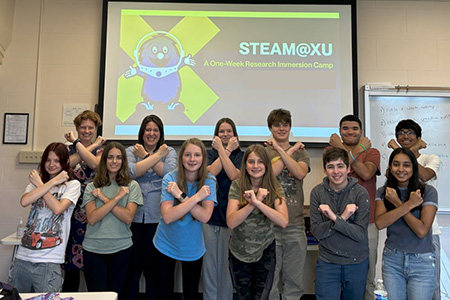STEAM@XU 2025
STEAM@XU is a one-week research immersion camp for high-school students to be held in summer 2025 for STEAM (science, technology, engineering, arts and mathematics) disciplines.
Registration Now Open

About the Camp
- August 4-8, 2025, 9:30 a.m.-3:30 p.m.
- Open to incoming 9th-12th graders
- $495 per student (includes daily lunch, T-shirt, and all research supplies)
- Held on Xavier’s campus (housing not provided)
- Spots are limited, and preference for research group placement will be given to early registrants!
Get more at Xavier University
- Select your research experience based on your interests (see projects below!)
- Work directly with college professors to complete and present a research project to level up your college application
- Participate in workshops on college readiness, interview skills, and more
- Network with college students and professors to learn more about the college experience and your desired major
Please contact faculty coordinators Dr. Kelly Crowe (crowek7@xavier.edu) or Dr. Hanna Wetzel (wetzelh@xavier.edu) with any questions.
Available Research Projects for 2025 Participants
Explore proteins in virtual reality with Dr. Mills
Proteins that make up the cell are too small to be seen with the naked eye... unless you use virtual reality! Here, you will explore how changes to a person’s genetic code alter their proteins, the building blocks of life. You will use virtual reality to zoom in on these microscopic molecules to discover how they work and how they would change their function based on an individual’s genetic makeup.
Investigate water bears under the microscope with Dr. Morris
Tardigrades, also known as water bears, are microscopic organisms that live all around us and have some amazing abilities. They can go decades without food and water, survive in outer space, and live in temperatures all the way from –300 to 150 degrees! Here, you will use a microscope to test tardigrade behavior to learn more about these fascinating organisms.
Synthesize glowing jellyfish proteins with Dr. Gagliani
Want to make some glow-in-the-dark bacteria? We can do this by introducing DNA from fluorescent deep-sea jellyfish into bacterial cells. Outside of being very cool, discovering how to better add fluorescent (light-up) proteins to cells has important biomedical applications in helping us understand how our own cells work. Once you have isolated your fluorescent jellyfish protein, you will design your own experiment to see how the protein responds to environmental changes.
Deep dive into Lord of the Rings with Dr. Yandell
We all know that J.R.R. Tolkien's The Hobbit and The Lord of the Rings are masterpieces, but just how did Tolkien choose his words? It’s your job to find out! You’ll use historical context, word frequency, word origins, and the context of individual words to discover how Tolkien’s language choices made his works stand the test of time.
Analyze hair samples using forensic science with Dr. Schmitzer
Welcome to CSI, Xavier edition! When analyzing a crime scene, you need to figure out the source of biological material to catch the offender. Here, you’ll use cutting edge technology to learn how hair analysis is used to link suspects to a crime and collect your own hair samples to analyze.
Explore the great outdoors with Dr. Mitchell
Get out into nature and discover how science can be done in our own backyard! You’ll travel to field sites in our community each day to develop and test hypotheses about how plants and animals in our area interact with their environments.
Test dietary supplements using tea leaves with Dr. Kradtap
While we need iron in our diet to make red blood cells, too much can be dangerous- so, it’s important to know how much iron is actually present in supplements! While toxic chemicals are normally used to figure this out, you will be developing a method to use tea leaves instead- this way, we can be good to our bodies AND the environment.
Make a computer model of fungal networks with Dr. Morris
While plants may look calm, they have a secret life under the soil- sending each other messages through an underground fungal superhighway! You will be using state-of-the-art computer modeling to predict how chemicals move through this fungal network, letting plants warn each other about environmental dangers.
Find out what affects health of your community with Dr. Ronis-Tobin
Did you know that your zip code can affect your health? Find out what affects the health of your community, right here in Cincinnati. How does our healthcare system work? What role do factors such as nutrition, exercise, neighborhood, and personal attitudes play in affecting how long one lives, and how good is one’s quality of life? Here, you will research how the context of our life affects our health. You’ll be using data and mapping tools to study relationships between location of resources such as grocery stores, hospitals, and more to determine which neighborhoods may be at risk for negative health outcomes.